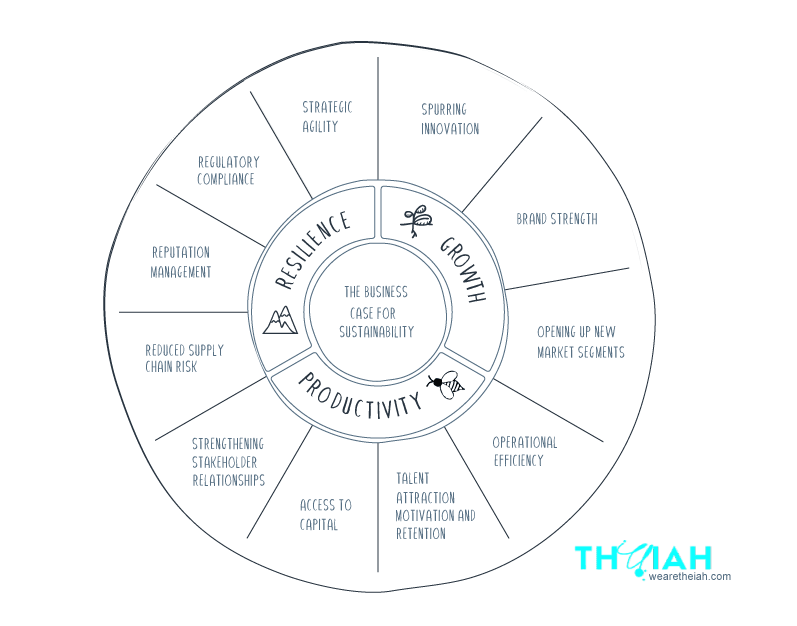Theiah insights

Productivity > Talent attraction, motivation and retention.
Younger generations in the workforce increasingly are committed to making social and sustainable impacts, pushing companies hunting for talented employees to follow suit.
Having a ‘social purpose’ is going to become especially critical for attracting and retaining talent as organisations recover from the coronavirus crisis (18).
“It’s a competitive advantage for large enterprises to really align themselves with employees’ ideas about creating more environmentally sustainable choices.”
Evan Caron, co-founder of Swytch, the blockchain-based clean energy
Firms with stronger sustainability and social purpose built into their strategy see their performance improved through improved talent attraction, satisfaction and motivation, and reduced turnover.
Improved talent attraction
A recent poll shows that millennials and Gen Z’s are more concerned (20) about the environment than any previous generation (21). This means they prioritise employers (22) who put sustainability at the forefront.
Millennials will make up ¾ of the workforce within 6 years (15). Ignoring this growing desire, businesses risk alienating talent, and could inadvertently be restricting their access to a young, talented and socially-responsible workforce. Given the talent acquisition challenges facing organizations, it is now more important than ever to reconsider your business’s sustainability policies.
- 61% of office workers say sustainable business practices are a “must-have” for companies. (17)
- 42% of the current modern workforce wants to work for an organization that has a positive impact on the world (16)
- This increases in the Millenial bracket: more than 70% said that they were more likely to choose to work at a company with a strong environmental agenda; a substantial increase from the 25% of Gen X and 17% of baby boomers who would make that choice (15).
- 3/4 of America’s millennial workforce prioritizes sustainability over other factors that determine the attractiveness of a job.
- In the current workforce, 1/10 would actually take a pay cut to work at a more sustainable company (15
- For millennials, this increases dramatically, with three quarters said that they’d take a smaller salary to work at a company more in alignment with their values. (16)
- 64% of millennials said that they wouldn’t take a job at a company that wasn’t socially responsible (16)
- Companies that invest in sustainability initiatives tend to create sought-after culture and engagement due to company strategy focusing more on purpose and providing value to society. (5)
Improved productivity
Green practices make a company more attractive because so many employees want to work for a company that is green, but research show it’s more than just wanting to work there—it’s working more. (12)
Companies that embed sustainability in their core business strategy find employees are more engaged and have higher work satisfaction. This is driven by:
- A sense of pride: employees are proud to work there (5)
- A shared sense of purpose: employees feel part of a broader effort. (6)
- Feeling valued: employees are often treated as critical stakeholders in sustainability efforts, just as important as shareholders. (14)
- Employees are more motivated, receive more training, and benefit from better interpersonal relationships through a shared sense of purpose; leading to increased productivity. 8)
- This leads to improved productivity and quality of work. Studies show that businesses with better environmental standards and corporate social responsibility can increase productivity by around 16% (2, 3)
- 53% would work harder if they were making a difference to others. (14)
- One study found that morale was 55% better in companies with strong sustainability programs, compared to those with poor ones (7). Better morale and motivation translate into reduced absenteeism and improved productivity. (7)
- Companies with high employee satisfaction outperformed their peers by 2.3%-3.8% per year over a 28-year period. That’s 89%-184% compounded. (1)
- Nearly 70% of respondents said that if a company had a strong sustainability plan, it would affect their decision to stay with that company long term. (15)
Reduced turnover and labour costs
- Studies show businesses with better environmental standards and social responsibility reduce employee turnover by between 25-50%. (2, 3, 9)
- Improved sustainability standards can also reduce annual quit rates by 3-3.5% (10)
- This saves replacement costs - up to 90%-200% of an employee’s annual salary for each retained position. (11)
- 30% of employees say they’ve left a job in the past because of the company’s lack of a sustainability plan (15), while 40% said they would look for a new job if their company didn’t follow sustainable business practices. (17)
- Employee loyalty was 38% better in companies with strong sustainability programs, as opposed to those with poor ESG performance (7)
“It’s a virtuous circle, the opposite of a vicious cycle. You attract the best people, and because you’re open-minded, then you adopt green standards, and then you attract even better people, and this continues to feed itself. Companies that adopt these policies tend to be better. It could be they were better to start with, but there are mechanisms built into these policies that mean they continue to get better.”
Professor Magali Delmas, an environmental economist at UCLA’s Institute of the Environment and Sustainability and the UCLA Anderson School of Management (12)
References:
-
www.london.edu/think/how-great-companies-deliver-both-purpose-and-profit
-
https://www.nbs.net/articles/environmental-performance-boosts-employee-productivity
-
https://phys.org/news/2012-09-employees-green-companies-significantly-productive.html
8)http://www.ioe.ucla.edu/perch/resources/2013-delmas-pekovic.pdf
(9) http://3blmedia.com/theCSRfeed/CBSR-Blog-CSR-Driver-Employee-Engagement
(10) http://dx.doi.org/10.1108/14720701011085544
-
https://www.shrm.org/about/foundation/research/documents/retaining%20talent-%20final.pdf
-
https://phys.org/news/2012-09-employees-green-companies-significantly-productive.html
-
https://hbr.org/2016/10/the-comprehensive-business-case-for-sustainability
-
http://www.globaltolerance.com/thought-leadership/the-values-revolution/
-
https://www.conecomm.com/research-blog/2016-millennial-employee-engagement-study
-
https://www.tlnt.com/gen-z-wants-to-know-are-you-practicing-sustainability/
18)https://www.personneltoday.com/hr/purposeful-work-essential-to-attracting-talent-post-covid/
- About
- Journal
- Contact
- # Keep in touch
- support@aristotheme.com
- +90 530 737 2 444
- # Socials
- dribble
- youtube
- About
- Journal
- Contact
- External Link
- # Keep in touch
- support@aristotheme.com
- +90 530 737 2 444